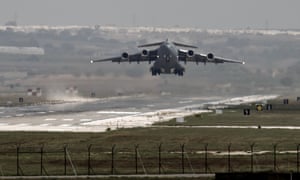
The Guardian
Link
In what may prove a turning point in the fight against Islamic State(Isis), Turkey has struck a military and security cooperation pact with the US that could greatly enhance the effectiveness of coalition air strikes. But what US officials describe as a game-changing deal also comes with a potentially high price tag: the escalating spillover of the Syria-Iraq conflict into neighbouring Middle East countries.
In cutting the deal, Barack Obama chose his moment well. For months, negotiations between Washington and Ankara over the possible use of Turkish military bases in the coalition’s air campaign against Isis had been getting nowhere. Then, last Monday, an Isis suicide bomber killed 32 people in an attack in the Turkish town of Suruç, near the Syrian border.
The resulting pressure on Recep Tayyip Erdoğan, Turkey’s president, to hit back was intense. Since the crisis erupted last year following the fall of Mosul to Isis, Erdoğan has focused more on thwarting Kurdish separatist ambitions in lawless parts of Iraq and Syria than on defeating terrorists. He refused to help Kurdish forces besieged in Kobani. For many months Turkey did little to stop foreign recruits crossing its border to join Isis.
Erdoğan’s intelligence services have been accused of secretly backing Isis and other Islamist groups as a means of containing the Kurds, hoping at the same time to further weaken the Syrian regime of President Bashar al-Assad, which Turkey opposes.
Demands for Turkey’s assistance were doubly unwelcome given Washington’s criticisms of Erdoğan’s authoritarian, neo-Islamist leadership style, his attacks on human rights and press freedom, and his open hostility to a key US ally, Israel. But Erdoğan cuts a somewhat weakened figure these days, after voters rebuffed his attempt to create an executive presidency in elections in June.
Having misjudged the public mood, he has much ground to make up. The Suruç bombing demanded a radical rethink. And just as he was considering what he should do, Obama – with perfect timing – came on the line. Turkish and US officials say, blandly, that the telephone conversation between the two men on Wednesday ended with agreement to “stem the flow of foreign fighters and secure Turkey’s border with Syria”. Bülent Arınç, Turkey’s deputy prime minister, said: “There is a consensus [and] unanimity of thought and action has been reached about the issue of joint operations in the future.”
Although Erdoğan is all but keeping schtum, the new understanding with Washington may go much further than simply allowing US (and British) use of the Incirlik airbase in Adana from early August. Incirlik will give coalition aircraft a huge advantage. Instead of flying 2,000km from bases and carriers in the Gulf, they will now be within 400km range of Raqqa, the Isis headquarters in Syria, giving them much greater operational flexibility and scope.
But Turkish reports suggest the agreement also covers the “emergency” use by allied aircraft of other Turkish airbases, including those in the south-eastern provinces of Batman, Diyarbakır and Malatya, plus more general permission to use Turkish airspace. It seems another longstanding US proposal, to fly armed or surveillance drones out of Turkey, has also been accepted.
As seen on Friday, Turkish airforce bombers are now also getting directly involved for the first time, even though Turkey is not a member of the coalition.
Erdoğan did not simply roll over. He had his own tally of requirements when Obama called. Top of his list is the establishment of a designated buffer zone inside Syria – effectively a de facto no-fly zone protected by coalition and Turkish forces – which would provide a safe haven for refugees and deny crucial territory to the Syrian Kurds. Turkish reports suggest the US has quietly agreed to this, although no official announcement has been made.
“The 90km line between Mare [Marea] and Cerablus [Jarabulus] [in northern Syria] will be 40 to 50km deep,” Hürriyet newspaper reported, quoting unidentified official sources, who added that the zone could be expanded in future. “This security line will prevent radical groups such as the Isis or the al-Qaida-affiliated al-Nusra Front from gaining the mentioned land. US-led coalition jets will provide security over the land ‘when needed’, carrying out ‘attacking or exploration’ flights, sources said.” Such operations could presumably involve British combat jets as well as American planes.
Under the reported no-fly zone agreement, Syrian regime jets will not be permitted within the zone, and those that violate it will be targeted, Hürriyet reported. And, it suggested, the US has agreed to turn a blind eye to possible future Turkish military action against the Syrian Kurds. “The agreement did not directly target the Syrian-Kurdish Democratic Union party (PYD), but a counter move will be possible if the PYD and its armed forces, the People’s Protection Units (YPG), threaten the Turkish border, namely bidding to change the demographic structure, according to sources. However, they said the US would not take a direct stance against the PYD, which is now fighting against Isis.”
In addition, Turkey is planning new border security measures to halt the flow of foreign jihadis, including surveillance balloons and West Bank-style fortifications and separation walls. In return, it has been assured that European countries such as Britain will do more to prevent would-be Isis recruits heading for Turkey.

No comments:
Post a Comment